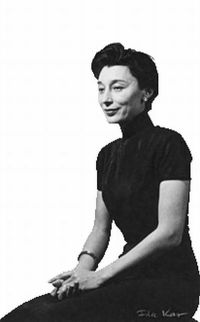Han Suyin
Han Suyin (韩素音) or Elisabeth Comber (Sep.12, 1917—Nov. 2, 2012) is a Chinese-born British writer, known for her best seller "A Many Splendored Thing," which was adapted into a Hollywood production entitled "Love is a Many-Splendored Thing" in 1955.
Born into a multi-cultural family in Xinyang of Henan Province, in a time and age when cross-border marriages were still highly frowned upon and even discriminated, her father was Chinese, whereas her mother was a Belgian citizen.
Yet the family, composed of pure love, and its background were actually more noble and romantic than what general thinking stratified. Her father Zhou Wei, a railway engineer from Sichuan, met Marguerite Denis in Belgium, where Zhou was sent to receive a higher academic education.
They returned to Sichuan Province, Zhou’s birthplace, upon his graduation from the University of Brussels after having completed a three-year engineering stint in Belgium. However, in order to get away from the intensive and curious stares from the locals, who only got very few opportunities to meet and greet the world that lies so far away from their families, Zhou left Sichuan to find himself a engineering post on the Longhai Railway, a railway extending from southern Jiangsu to central Gansu.
Financially and technologically sponsored by Belgian companies, Zhou hoped Denis would have felt much more at ease in their new home base. However, the discrimination from European colleagues seemed equally cruel to the Sichuan locals’ blatant stares. Zhou’s salary was three quarters less than that of his Belgian counterparts and their kids were sneered at for being "hybrid."
Han was born at a peculiar time—right during the Mid-Autumn Festival of 1917, according to Chinese lunar calendar. It was for this reason that her father literarily called her a guest from the moon.
She would get a moon-cake each time her birthday came around and in Han’s mind the taste would remain as luscious as it once was in her mouth-even when she recalled these times as an adult living abroad.
She had long been dreamed of being a doctor ever since an unknown British doctor in China left behind several books in the house Han and her family moved into during their holiday stay in Beidaihe, a beach town in Hebei Province.
Swimming in the daytime and reading at night, Han gradually became enthralled by the beauty of physical science. One brief encounter with a group of blind wanderers shaking uncontrollably against the freezing wind at the church gates the next year, enhanced her determination as she tearfully told her mother she would one day use medicine to alleviate their pain in the darkness.
Life proved that her path to the medical academy would never run smoothly.
When completing her English and French studies, she was advised to take on a job that would receive family subsidies at the age of 15.
She got herself a job at Peking Union Medical College Hospital and was happy with the post due to its proximity to medical science (even though her salary was 10 times lower than that of the so-called pure European natives).
In the 1930s, she was admitted to the preliminary classes at Yanjing Medical School and contemplated going to Belgium to pursue her further studies. But the issue of academic expenses proved to be a tough one and one far bigger than her total savings at that time-300 yuan. Despite her mother’s hesitation, who wished for her daughter to become a wife with a happy family like she herself was, Han said she’d rather become a prostitute than not obtain the scholarship for overseas study. Hence, from 1935 onwards, Han enjoyed an abundant academic life at the Free University of Brussels for three years under a 15,000-Belgian franc scholarship as well as her grandfather’s generous tending.
After three-year of excelling in all fields of rudimentary science, Han had been never so close to her medical dream. She only had to make it through three more academic years. But then disaster hit as World War II changed her life, which as she later commented was a historic event that put a whole generation to the test.
In the ensuing years, she went back to China on several occasions and saw two marriages break down. She did not obtain her physician’s degree until 1948. She then opened her own clinic till 1964. In 1956, she met her soul-mate and future husband, an Indian native to whom Han gave the Chinese name Lu Wenxing. Their peaceful marriage lasted until Lu’s death in 2003.
In 1952, her work "A Many Splendored Things" made a big splash in the western literary world and she was thus recognized as a cultural figure. Since 1980, many of her literary works, including "The Crippled Tree," "Mortal Flowers," and "Birdless Summer," have been introduced to China.
In her later years, she dedicated herself to China’s translation field and created the Han Suyin Award for Young Translators, one of the nation’s most prestigious translation awards.
Han passed away in her sleep in Lausanne, Switzerland, at the age of 96.
